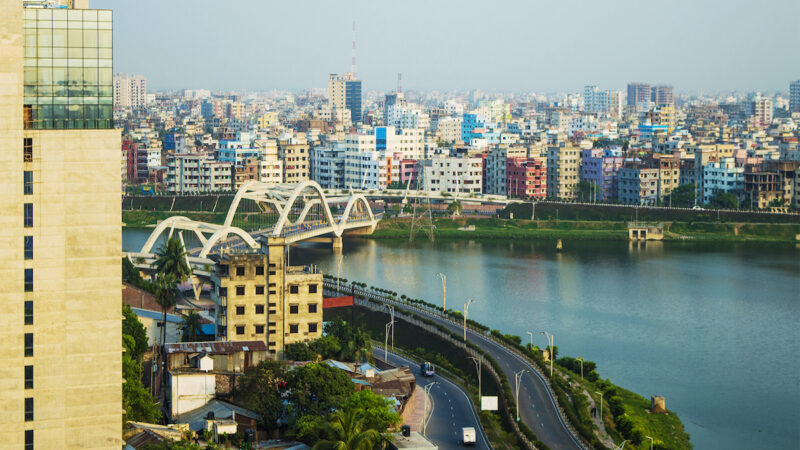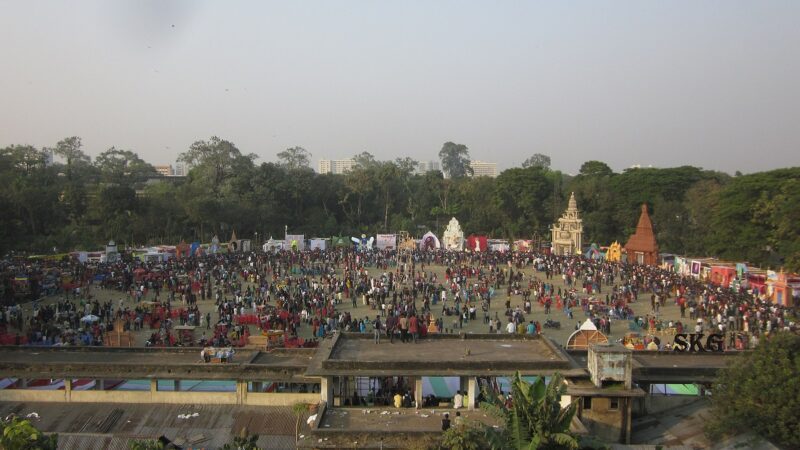 [1]
[1]In terms of population, Dhaka is the second largest city in South Asia and the seventh largest in the world. Image via Wikipedia by ASaber91 [1]. CC BY 2.0 [2].
Dhaka, the capital of Bangladesh, is a megacity, and one of the most crowded cities [3] in the world. The urban areas of the city are home to more than 22 million people [4].
However, the number of open spaces, parks and playgrounds in this city is very low compared to the population. And that number is decreasing day by day. In the past few decades, markets, mosques, rickshaw garages, parking lots, and commercial establishments have been built [5] on parks and open spaces by government organisations. Recently, the construction work of a police station building started at an open space used as a playground for children in the Kalabagan area of the city and was met with protests by the locals.
Where will the children play?
Due to the increase in population, open land is becoming scarce and very expensive in Dhaka.
The Tentultala field is a 0.2-acre open space beside a small lane in the congested Kolabagan area of the city, and has been used by the local children as a playground for the past five decades [6]. On January 31, 2022, the land was allocated [7] to Dhaka Metropolitan Police to build a permanent building for Kalabagan Police Station which is currently operating in a rented space. In the first week of February, police cordoned off [8] the space with barbed wire and the locals started protests with placards and human chains [9] demanding that the land be released for the children to play. The protest campaigns were being documented on the Facebook page [10] titled “তেঁতুলতলা মাঠ আমাদের প্রাণের দাবী” (The Tentultola ground is our heartful demand) but the issue was unknown to many.
 [11]
[11]View of the construction work of the police station building at Tentultala ground in Kalabagan. Photo by Trishia Nastaran [11]. Used with permission.
However, the issue caught the headlines when Syeda Ratna, the coordinator of the local protest campaign, and her son Mohammad Isha Abdullah were detained [12] on April 24, while they were protesting the construction of a boundary wall. The police said that they were live streaming [13] on Facebook from the location and were preventing the authorities from discharging their duty. However, in the face of widespread criticism [14] on mainstream and social media, the police released them in the early hours of April 25, after holding them for 13 hours.
Twitter user Ruposh Bangla shared a cartoon by cartoonist Mehedi:
সৈয়দা রত্না: খেলার মাঠে পুলিশের ভবন নির্মাণের বিরুদ্ধে আন্দোলন করায় মা ও ছেলে আটকের পর মুচলেকা দিয়ে ছাড়া পেল pic.twitter.com/QBPXZGIYxh [15]
— Ruposh Bangla (@ruposhbangla) April 25, 2022 [16]
Syeda Ratna: Mother and son released on bond after protesting against the construction of a police station on a playground.
Deutsche Welle Bangla reported:
পুলিশ মাঠ দখলের বিরুদ্ধে আন্দোলনকারী মা সৈয়দা রত্না ও তার কিশোর ছেলেকে বিনা ওয়ারেন্টে , বিনা মামলায় ১৩ ঘন্টা আটক রেখে প্রচলিত আইন ও সংবিধানের লঙ্ঘন করেছে। #Bangladesh [17] https://t.co/Vre1uXlOYu [18]
— DW বাংলা (@dw_bengali) April 25, 2022 [19]
The police have violated the local law and the constitution by detaining protestor Syeda Ratna and her teenage son for 13 hours without a warrant or a charge.
Political activist Rafid Al Bukhari Talukdar [20] wrote on Facebook:
বিশ্বের অধিকাংশ শহর যেখানে স্থাপনা অপসারণ করে উন্মুক্ত স্থানের পরিমাণ বাড়াচ্ছে, ঠিক তার বিপরীতে ঢাকাকে ক্রমেই কংক্রিটের জঞ্জালে পরিণত করা হচ্ছে। জাতি হিসেবে আমরা লজ্জিত।
When many cities in the world are increasing the number of open spaces by removing unnecessary installations, open spaces in Dhaka are gradually transforming into concrete dumps. We are ashamed as a nation.
Nowadays children in Dhaka are mostly growing between four walls as the playgrounds are shrinking. In an op-ed on Dainik Shikhsa [21] (the Daily Education), Tanjinul Haque Molla showed that there is a direct correlation between the decrease in playgrounds and the rise of crimes in the city.
বর্তমানে খেলার মাঠ কমে যাওয়ার কারণে ছেলেমেয়েরা প্রযুক্তির ওপর নির্ভরশীল হচ্ছে। যার ফলে তাদের আচরণগত পরিবর্তন হচ্ছে। ইচ্ছাকৃতভাবে স্কুল পালাচ্ছে। কিংবা সেখানকার নিয়মশৃংখলা ভঙ্গ করছে। এমনকি রাষ্ট্রিক আইন বা পৌর বিধিবহির্ভূত কাজ করছে। মাতা-পিতা বা অভিভাবকের নিয়ন্ত্রণের বাইরে চলে যাওয়া ছেলেমেয়েরা পর্নোগ্রাফি বা মাদকে আসক্ত হচ্ছে দিন দিন।
Children are becoming more dependent on technology and increased screen time as they do not get a chance to play in the open. As a result, their behaviour is changing – some are skipping school, or breaking the rules here and there. They are becoming more prone to breaking laws. Children who are going out of the control of their parents or guardians often gradually become addicted to pornography or drugs.
Journalist Saiful Islam Sifat [22] reminded us on Facebook:
খেলার মাঠ যত কমবে, থানার প্রয়োজনীয়তা ততো বাড়বে। এবার ভাবতে হবে আমরা কোনটা বেশি চাই। থানা, নাকি খেলার মাঠ?
As the playgrounds keep vanishing, there will be a greater need for police stations. Now, we have to think – which one do we want more: police stations, or playgrounds?
 [23]
[23]The Jagannath Hall Field of Dhaka University. Apart from sports, the ground is used for various religious and cultural events. Image via Wikipedia by Sujoygomasta [23]. CC BY-SA 3.0 [24].
The vanishing playgrounds of Dhaka
As per [6] Adil Mohamad Khan, former general secretary of Bangladesh Institute of Planners [25] (BIP), 30 percent of wards in Dhaka city do not have any open space as a playground or park, hindering the mental and physical growth of children in those localities.
BIP conducted a survey [26] in 2019 about the available open spaces and the results were bleak. A few years ago, the number of total fields in Dhaka was around 230. Of these, 140 were owned by institutions and were located inside their gated compounds. In addition, over 50 privately owned places were used by children as open fields. Around 40 fields were in public spaces. Now there are only 24 fields in public spaces in Dhaka. Children are no longer allowed to play in many of the private fields as construction has started in those places or they are now off-limits.
Another report [27] detailed how educational and other government institutions are building new structures like community centres, gymnasiums, staff accommodations etc., shrinking available open spaces in their compounds.
The Institute of Planning and Development mentioned [28] that as per the detailed area plan [29] for Dhaka city, there should be two to three playgrounds of about 3 acres in a locality of 12,500 people. However, these criteria are not maintained.
Professor Kamal Chowdhury of the Department of Clinical Psychology at Dhaka University commented on Facebook [30] that the lack of open spaces for play is causing mental problems among the children and teenagers of the city. He wrote on his Facebook status:
শহরে বেড়ে উঠা শিশুদের মানসিক ও শারীরিক সমস্যা আগের তুলনায় অনেক বেশি বেড়ে যাওয়ার একটা অন্যতম কারন তারা শারীরিক শক্তি নির্ভর কোনো খেলাধূলায় নাই বা তার সুযোগ নাই।
One of the reasons behind the increase in mental and physical problems of the children in Dhaka is that they do not have access to any sports where they can work up physically.
Even in the face of the criticism, the construction [31] of the police station building in Tentultala was continued. However, on April 28, the prime minister ordered the work [32] to be stopped and the protesters were overjoyed [33] by this news.
Adil Muhammed Khan commented [34] in an interview with the Daily Prothom Alo that the success of this movement for open space should be an inspiration to protect other fields of Dhaka city.